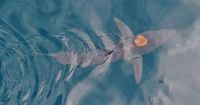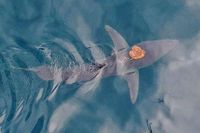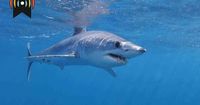Video footage of an octopus riding on the back of a shark has captivated audiences worldwide since it was released by researchers at the University of Auckland earlier this week. The remarkable encounter, dubbed "sharktopus," took place in the Hauraki Gulf during the summer of 2023, when researchers spotted a Maori octopus perched atop a shortfin mako shark. The team, which was initially on the lookout for a feeding frenzy, stumbled upon this unlikely duo casually riding the waves together.
According to a blog post by Rochelle Constantine, a professor of biological sciences at the University of Auckland and one of the researchers involved, the team first noticed a large dorsal fin, indicating the presence of a shark. Upon closer inspection, they observed an "orange patch on its head." Initially, they suspected it might be an injury or that the shark had collided with a buoy. To investigate further, the researchers deployed a drone and dropped a GoPro camera into the water. What they discovered was astonishing: an octopus clinging to the shark's head with its tentacles.
“An octopus perched atop the shark’s head, clinging on with its tentacles,” Constantine detailed in her blog. “This ‘sharktopus’ was a mysterious find indeed.” She explained that while octopuses typically dwell on the seabed, shortfin mako sharks prefer the open ocean. The octopus seemed to be enjoying a speedy ride, as the shortfin mako is known to be the fastest shark species, capable of swimming up to 50 kilometers per hour.
The Hauraki Gulf, known as Tīkapa Moana, Te Moananui-ā-Toi, is home to various shark species. Constantine studies shark behavior in this region during the summer months. The gulf is frequented by species such as bronze whalers and smooth hammerheads, which divers and fishers often encounter in shallower waters. Additionally, larger open-ocean species like the dusky shark and the blue shark are also present. However, the smaller sharks that inhabit the seabed, including lemon fish and native carpet sharks, remain less understood.
Despite the excitement surrounding the discovery, global shark populations are facing significant threats. Overfishing, climate change, and low reproductive rates are contributing to a steep decline in shark numbers. Constantine emphasized that the encounter with the "sharktopus" serves as a reminder of the ocean's wonders and the importance of conservation efforts. “One of the best things about being a marine scientist is that you never know what you might see next in the sea. By supporting conservation initiatives, we can help to ensure that such extraordinary moments keep happening,” she concluded.
The footage has sparked interest not only among marine biologists but also among the general public, illustrating the fascinating interactions that can occur in the ocean's depths. Nick Eicher, a host from WORLD Radio, remarked on the surprising nature of the encounter, stating, “Scientists studying the coast of New Zealand recently released video of one of the ocean’s most unlikely hitchhikers.” He described the moment when researchers first spotted the bright-orange blob attached to the shark’s head, quickly identifying it as an octopus with its tentacles wrapped around the shark like reins.
As marine life continues to face challenges, such captivating moments remind us of the need for further exploration and understanding of ocean ecosystems. The unexpected companionship between the octopus and the shark not only highlights the diversity of marine life but also raises questions about how such encounters might occur in the wild. “How in the deep blue sea these two met is a mystery,” Eicher noted, emphasizing the enigma surrounding their interaction.
In a world where human activities increasingly threaten marine habitats, stories like the "sharktopus" encounter serve to inspire and educate. They encourage a sense of wonder about the ocean and its inhabitants while reinforcing the urgent need for conservation efforts to protect these ecosystems. As scientists continue to study marine life, they hope to uncover more extraordinary moments that reveal the intricate relationships within the ocean.
As the world reflects on the implications of this unique find, it underscores the importance of protecting the environments where such interactions can thrive. The ocean, with its vast mysteries, continues to surprise and intrigue, reminding us of the delicate balance of nature and the need for stewardship to ensure that future generations can also experience the wonders of marine life.






